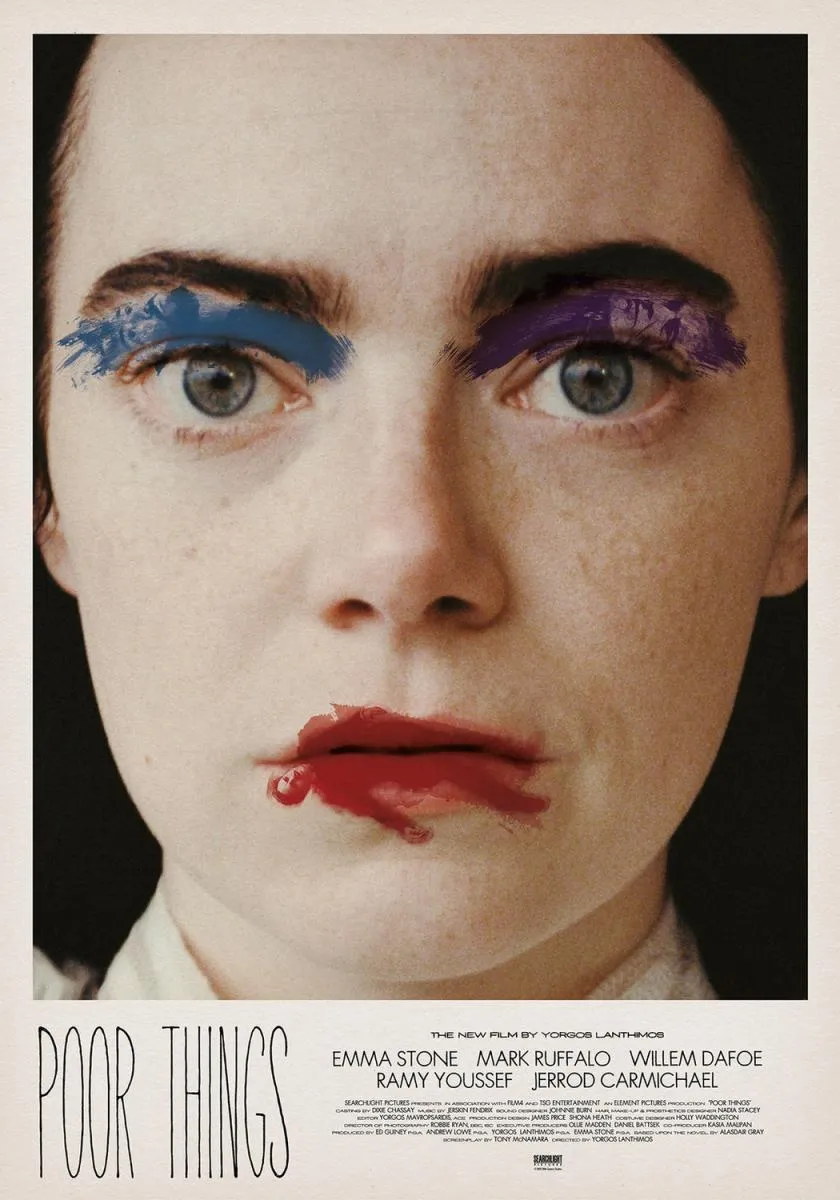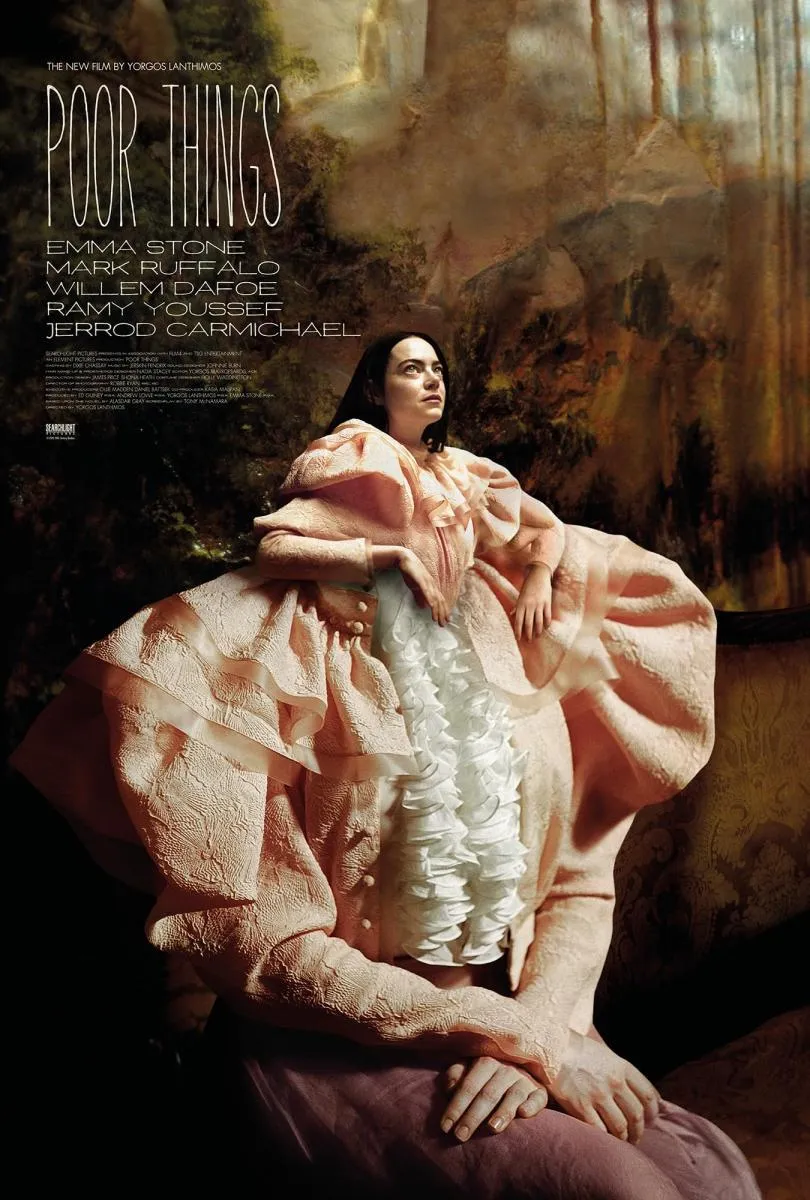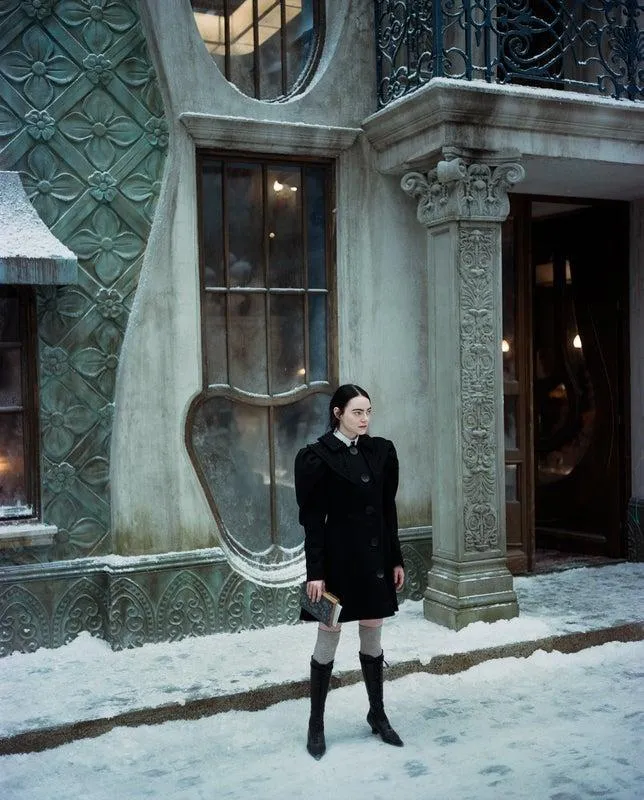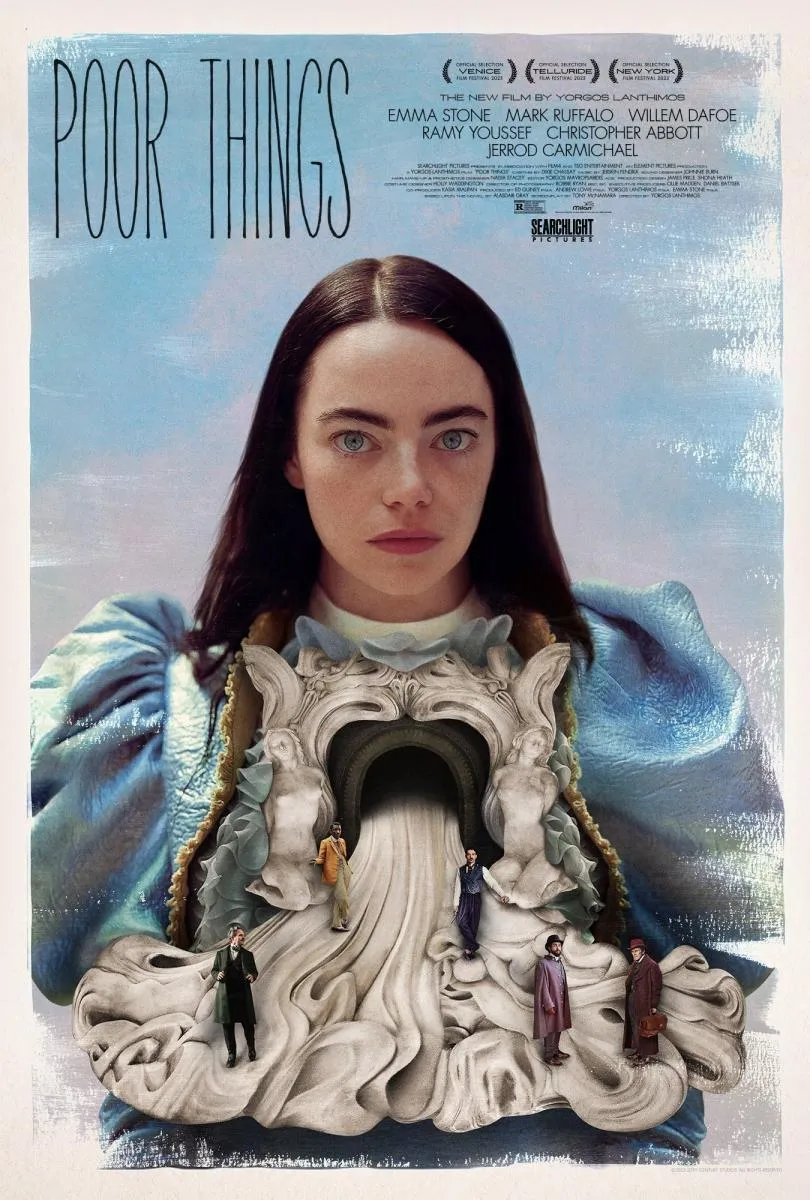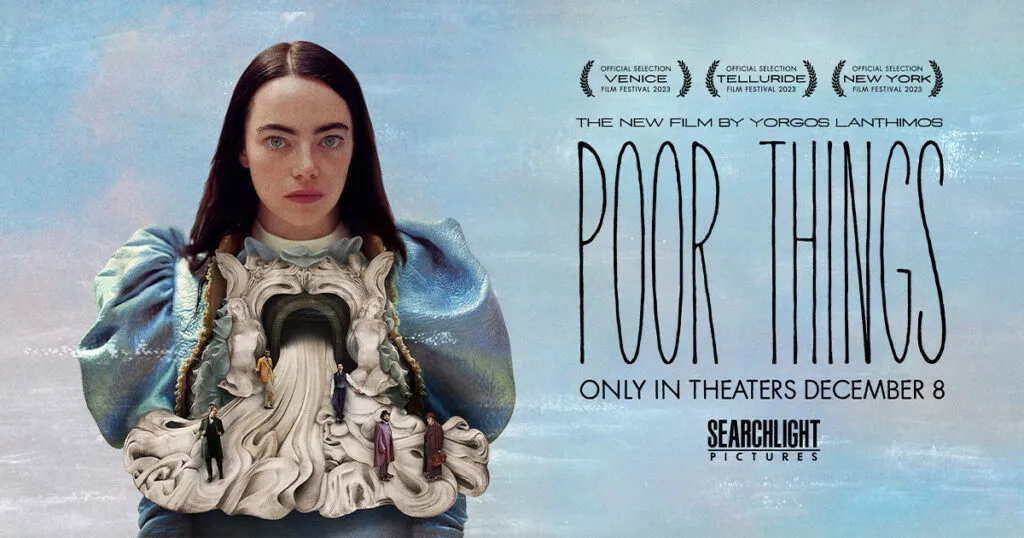
Tiene 11 nominaciones a los próximos premios Oscar
The film that has the most nominations for the next Academy Awards is the already iconic Oppenheimer, which will compete in 13 categories, closely followed by another film that has the not inconsiderable number of 11 nominations: Poor Things by Greek director Yorgos Lanthimos, which is currently in theaters and I finally got to see it last night.
La película que tiene más nominaciones a los próximos premios de la academia es la ya icónica Oppenheimer, la cual competirá en 13 categorías, seguida muy de cerca por otro film que tiene la nada despreciable cantidad de 11 nominaciones: Poor Things del director griego Yorgos Lanthimos, la cual está actualmente en cines y finalmente la pude ver anoche.
The first thing I have to say is that Poor Things was not what I expected. In the first instance, I must clarify that I never saw a promotional trailer for the film, other than some clips of a few seconds and that I got an idea through the comments of a couple of people who I now think had not seen the film. You may have heard that this story that mixes fantasy, drama, comedy and science fiction is a retelling of Frankenstein, but stopping there is making a poor judgment because, although there are evident (and few) similarities, Poor Things in reality is much more. The script, written by Tony McNamara, is based on the 1992 novel of the same name by writer Alasdair Gray, which in addition to what has been said above also incorporates elements of magical realism and eroticism. A lot of eroticism. And this is the part I didn't expect to see. I don't usually create many expectations before watching a movie, but in this case some references conditioned my mind about what I would see and I didn't expect to see so many graphic sex scenes. It's not a criticism. In fact, in the context of the plot, I understand the high sexual content, but I warn those who have not seen it. Poor Things is the adventure of a wonderful protagonist who discovers the world, with its pleasures and horrors, amidst landscapes and characters that seem to come out of a psychedelic dream.
Lo primero que debo decir es que Poor Things no fue lo que esperaba. En primera instancia, debo aclarar que no vi nunca un avance promocional de la película, más que algunos clips de pocos segundos y que me hice una idea a través de los comentarios de un par de personas que ahora pienso que no habían visto la película. Quizás hayan escuchado que esta historia que mezcla fantasía, drama, comedia y ciencia ficción es un retelling de Frankenstein, pero quedarse ahí es hacer un juicio pobre porque, aunque hay evidentes (y pocas) semejanzas, Poor Things en realidad es mucho más. El guión, escrito por Tony McNamara, está basado en la novela homónima de 1992 del escritor Alasdair Gray que además de lo dicho anteriormente también incorpora elementos de realismo mágico y erotismo. Mucho erotismo. Y esta es la parte que no esperaba ver. No suelo crearme muchas expectativas antes de ver una película, pero en este caso algunas referencias condicionaron mi mente sobre lo que vería y no esperaba ver tantas escenas de sexo tan gráficas. No es una crítica. De hecho, en el contexto de la trama, entiendo el alto contenido sexual, pero hago la advertencia para quienes no la hayan visto. Poor Things es la aventura de una protagonista maravillosa que descubre el mundo, con sus placeres y sus horrores, en medio de paisajes y personajes que parecen salidos de un sueño psicodélico.
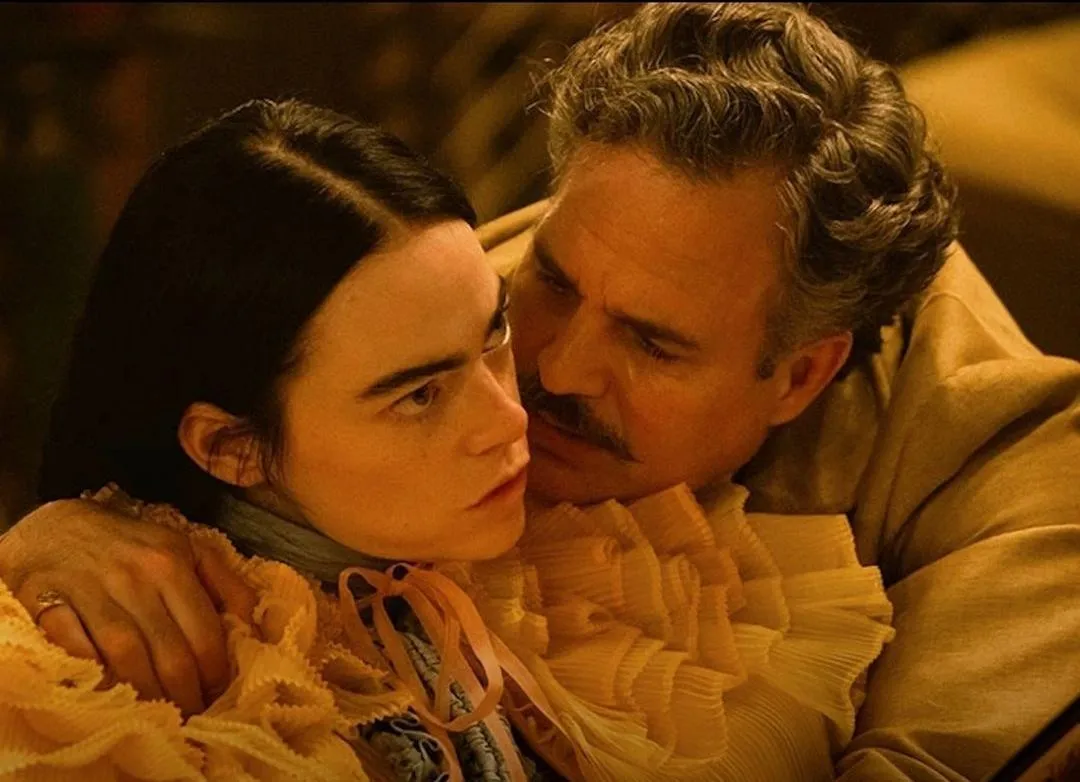
I don't want to give much away about the story itself, because a good part of the charm of the script is due to the revelations that are presented and certain twists in the plot, but to begin with I can say that the protagonist of this entire adventure is Bella Baxter (Emma Stone), a woman who was brought to life by Dr. Godwin Baxter (Willem Dafoe) and here would be that similarity with Mary Shelley's mythical creature and her Dr. Frankenstein, but the story is more complex than that.
De la historia en sí no quiero adelantar mucho, porque buena parte del encanto del guión se debe a las revelaciones que se van presentando y a ciertos giros en la trama, pero para empezar puedo decir que la protagonista de toda esa aventura es Bella Baxter (Emma Stone), una mujer que fue traída a la vida por el Dr. Godwin Baxter (Willem Dafoe) y aquí estaría ese parecido con la mítica criatura de Mary Shelley y su Dr. Frankenstein, pero la historia es más compleja que eso.
Dr. Godwin is the son of another doctor who, like him, always put science and progress above everything else, including the well-being of his experimental subjects. The scars that accompany his face, his hands and some of his other ailments were the result of the experiments that his own father did on him, but Godwin does not seem to resent him for that, because he understands that he did it in the name of science. That's where the reason for Baxter's also twisted mind comes from, whose mansion is surrounded by the most unusual animals one could see: a chog (part chicken, part dog), a chicken with a pig's head, a dog with a duck's neck and head... and Bella, whom he treats with a paternal feeling. But is Bella his daughter? No, and did he build it from the pieces of human corpses like in Shelley's novel? Not quite. The truth is that at the beginning of the film Bella presents the appearance of a woman, but the mentality of a little girl and as the film progresses she discovers not only the world but also her own body and what is even more important: her identity. I am not referring to her name or her origin, but to who she herself is. There is a part, especially in the second half of the film, in which Bella's philosophical questions did remind me of Dr. Frankenstein's creature which, by the way, is far from being the green and terrifying monster that the cinema sold us for many years.
El Dr. Godwin es hijo de otro médico que, como él, puso siempre la ciencia y el progreso por encima de cualquier otra cosa, incluido el bienestar de los sujetos de sus experimentos. Las cicatrices que acompañam su rostro, sus manos y algunos otros de sus padecimientos fueron el resultado de los experimentos que su propio padre hizo con él, pero Godwin no parece tenerle rencor por eso, porque entiende que lo hizo en nombre de la ciencia. De ahí viene la razón de la mente también retorcida de Baxter cuya mansión está rodeada de los animales más insólitos que uno pudiera ver: un gallo-perro, una gallina con cabeza de cerdo, un perro con cuello y cabeza de pato... y Bella, a quien trata con un sentimiento paternal. Pero, ¿es Bella su hija? No, ¿y la construyó a partir de las piezas de cadáveres humanos como en la novela de Shelley? No exactamente. Lo cierto es que al inicio de la película Bella presenta la apariencia de una mujer, pero la mentalidad de una niña y conforme avanza la película va descubriendo no solamente el mundo sino también su propio cuerpo y lo que es aún más importante: su identidad. No me refiero a su nombre o a su origen, sino a quien ella misma es. Hay una parte, sobre todo en la segunda mitad de la película, en la que los cuestionamientos filosóficos de Bella sí me recordaron a la criatura del Dr. Frankenstein que, por cierto, está lejos de ser el monstruo verde y aterrorizador que el cine nos vendió durante muchos años.
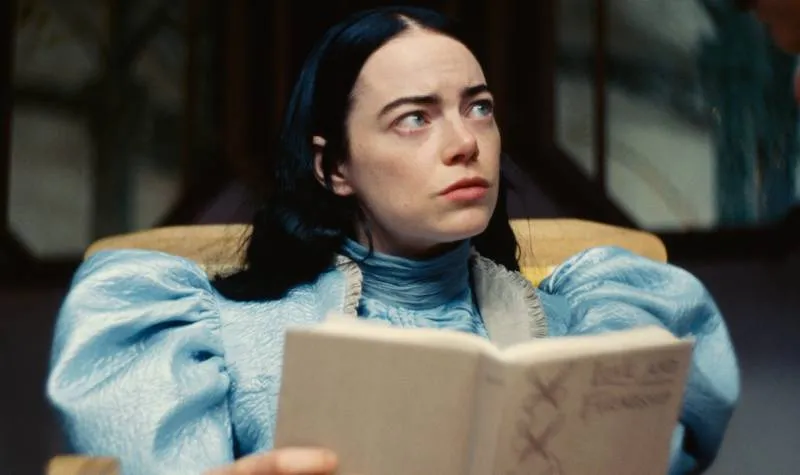
The production design is spectacular, a mix of colorful dream, futuristic antiquity and Victorian England, as is the costumes and makeup. The editing is very good, the photography exquisite and recursive (color, black and white, fisheye), the soundtrack is perfect for the story that also has a great script full of comedy, excellently directed by Lanthimos and incredible performances, especially that of Emma Stone, who here demonstrates her acting ability, taking herself physically and emotionally to territories that were unsuspected for me when I saw her in Easy A, La La Land or in The Favorite itself, her first collaboration with the Greek director. She was already one of my favorite actresses and one of the best of her generation, but what she does in Poor Things deserves a standing ovation. The feeling I have is that this film may shock many and may even be controversial and uncomfortable in some aspects. There will be no shortage of people who talk about topics that have been included in a forced way; If you criticized the feminist overtones in a film like Barbie, imagine finding female sexuality, patriarchy, sexual identity, hedonism, prostitution, in a film in which most of the male characters are somewhat ridiculed (in the good sense). Yes, there will be those who complain, there will be those who will be scandalized and there will be those who will not enjoy this film. What's more, there will be more than one who will say that it is a bad movie, just because it challenges convention and explores territories that are outside the margins of the normal.
El diseño de producción es espectacular, una mezcla de sueño colorido, antigüedad futurista y la Inglaterra victoriana, igual que el vestuario y el maquillaje. El montaje es muy bueno, la fotografía exquisita y recursiva (color, blanco y negro, ojo de pez), la banda sonora es perfecta para la historia que cuenta además con un gran guión cargado de comedia, excelentemente dirigido por Lanthimos y unas actuaciones increíbles, en especial la de Emma Stone que demuestra aquí su capacidad actoral llevándose física y emocionalmente a territorios para mí insospechados cuando la vi en Easy A, La La Land o en la misma The Favourite, su primera colaboración con el director griego. Ya era una de mis actrices favoritas y una de las mejores de su generación, pero lo que hace en Poor Things es para aplaudirla de pie. La sensación que tengo es que esta película puede impactar a muchos y puede resultar incluso polémica e incómoda en algunos aspectos. No faltará quien hable de temas que han sido incluidos de manera forzosa; si criticaron los tintes feministas en una película como Barbie, imagínense encontrar la sexualidad femenina, el patriarcado, la identidad sexual, el hedonismo, la prostitución, en una película en la que además la mayoría de los personajes masculinos resultan un tanto ridículizados (en el buen sentido). Sí, habrá quien se queje, habrá quien se escandalice y habrá quienes no disfruten esta película. Es más, habrá más de uno que dirá que es una mala película, solo porque desafía lo convencional y explora territorios que están fuera de los márgenes de lo normal.
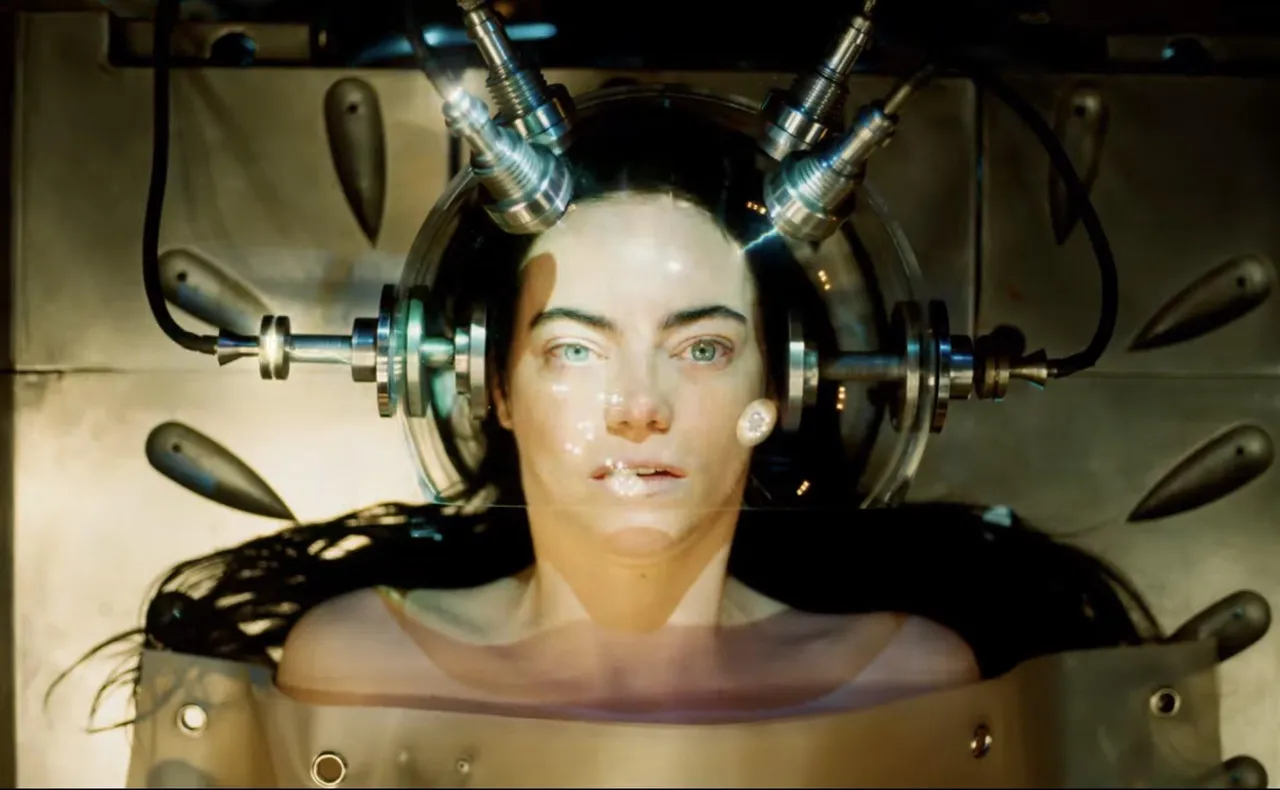
But Yorgos Lanthimos is not normal. If in The Lobster and The Killing of a Sacred Deer we were given the impression that there were normal characters who were pushed by the environment or circumstances in a strange direction, what can we expect from a Victorian drama that begins with the laboratory of a disfigured doctor who mixes animals and performs brain transplants? More than the two mentioned, Poor Things (winner in Venice) is related to Dogooth, which earned Lanthimos an award at the Cannes Festival, for that bubble in which the father kept the children, which is kind of what Dr. Baxter tries with Bella at the beginning, only our heroine manages to get out, see the world and observe humanity. Bella's innocence, an unprejudiced soul who at first confuses many things - not because of her inability but because the world sometimes doesn't make sense - makes her want to improve the world, but is it possible? Are human beings, by nature, cruel or kind? Can people own other people? How are the uncontrollable desires of the body and mind reconciled with the norms dictated by society? What link is there between love, possession and pleasure? Should we defend our freedom of expression at all costs and at all times or should we save appearances in some cases? A film that makes you reflect on these issues - and many more - cannot be taken lightly and is destined to be visited more than once, but always with a wide open mind, who of you has seen it? I read you in the comments.
Pero Yorgos Lanthimos no es normal. Si en The Lobster y en The Killing of a Sacred Deer nos dio la impresión de que habían personajes normales a quienes el entorno o las circunstancias empujaban en una dirección extraña, ¿qué se puede esperar de un drama victoriano que empieza con el laboratorio de un doctor desfigurado que mezla animales y realiza transplantes de cerebro? Más que a las dos mencionadas, Poor Things (ganadora en Venecia) guarda relación con Dogooth, que le valió a Lanthimos un premio en el Festival de Cannes, por esa burbuja en la que el padre mantenía a los hijos, que es un poco lo que el Dr. Baxter intenta con Bella al inicio, sólo que nuestra heroína logra salir, ver al mundo y observar la humanidad. La inocencia de Bella, un alma sin prejuicios que al principio confunde muchas cosas - no por su incapacidad sino porque el mundo a veces no tiene sentido -, la hace desear mejorar el mundo, pero ¿acaso es posible? el ser humano es, por naturaleza ¿cruel o bondadoso? ¿las personas pueden ser dueñas de otras personas? ¿cómo se concilian los deseos irrefrenables del cuerpo y de la mente con las normas dictadas por la sociedad? ¿qué vícnulo hay entre el amor, la posesión y el placer? ¿debemos defender nuestra libertad de expresión a toda costa y en todo momento o debemos guardar las apariencias en algunos casos? Una película que te hace reflexionar sobre estos temas - y muchos más - no puede tomarse a la ligera y está destinada a ser visitada más de una vez, pero siempre con la mente bien abierta, ¿quienes de ustedes la ha visto? Los leo en los comentarios.
Reviewed by | Reseñado por @cristiancaicedo
Other posts that may interest you | Otros posts que pueden interesarte:
 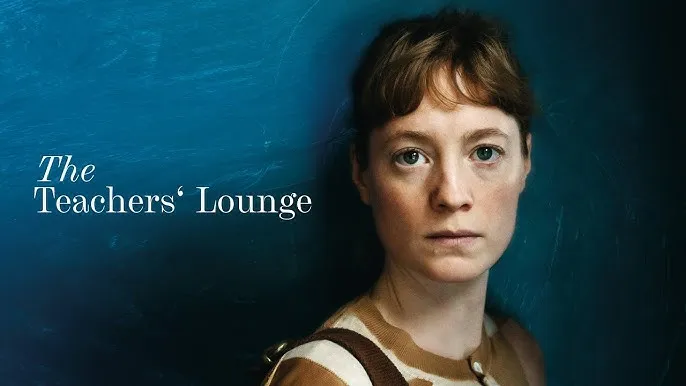 |
|---|
